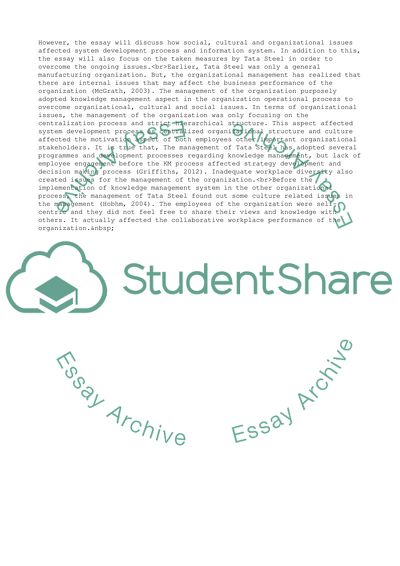Cite this document
(“Ethical KM Training for Tata Steel Essay Example | Topics and Well Written Essays - 1500 words”, n.d.)
Ethical KM Training for Tata Steel Essay Example | Topics and Well Written Essays - 1500 words. Retrieved from https://studentshare.org/management/1873305-you-have-been-employed-by-tata-steel-as-a-consultant-systems-designer-specialising-on-soft-issuescritically-examine-the-socialorganisation-and-cultural-issues-affecting-systems-development-at-tata-steel
Ethical KM Training for Tata Steel Essay Example | Topics and Well Written Essays - 1500 words. Retrieved from https://studentshare.org/management/1873305-you-have-been-employed-by-tata-steel-as-a-consultant-systems-designer-specialising-on-soft-issuescritically-examine-the-socialorganisation-and-cultural-issues-affecting-systems-development-at-tata-steel
(Ethical KM Training for Tata Steel Essay Example | Topics and Well Written Essays - 1500 Words)
Ethical KM Training for Tata Steel Essay Example | Topics and Well Written Essays - 1500 Words. https://studentshare.org/management/1873305-you-have-been-employed-by-tata-steel-as-a-consultant-systems-designer-specialising-on-soft-issuescritically-examine-the-socialorganisation-and-cultural-issues-affecting-systems-development-at-tata-steel.
Ethical KM Training for Tata Steel Essay Example | Topics and Well Written Essays - 1500 Words. https://studentshare.org/management/1873305-you-have-been-employed-by-tata-steel-as-a-consultant-systems-designer-specialising-on-soft-issuescritically-examine-the-socialorganisation-and-cultural-issues-affecting-systems-development-at-tata-steel.
“Ethical KM Training for Tata Steel Essay Example | Topics and Well Written Essays - 1500 Words”, n.d. https://studentshare.org/management/1873305-you-have-been-employed-by-tata-steel-as-a-consultant-systems-designer-specialising-on-soft-issuescritically-examine-the-socialorganisation-and-cultural-issues-affecting-systems-development-at-tata-steel.


